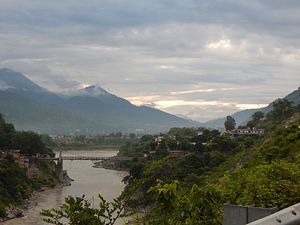The eve of Eid-ul-Fitr is supposed to be the longest day of patience and penance. Muslims across the world have to fast one more day before the sighting of the moon, which then marks the end of the holy month of Ramzan (Ramadan). This year, the eve of Eid-ul-Fitr was marked with immense pain in India-administered Kashmir, as prominent journalist Shujaat Bukhari was gunned down in his car, along with the two personal security officers he had been assigned following three previous assassination attempts.
Fifty-year-old Shujaat Bukhari was a man equally loved and despised. He was loved by his fellow Kashmiris, for they saw in him someone who kept alive the essence of Kashmiriyat by pushing for the Kashmiri language to be made mandatory in schools; he had campaigned to maintain Nastaliq, the traditional Perso-Arabic script, as the Kashmiri script. His cultural group had succeeded in introducing the Kashmiri language back in schools after a gap of over three decades. He wrote in Kashmiri, Urdu, and English. He was loved by journalists from the rest of India for his ability to forge ceasefire efforts, by initiating conversations both with Indian and Pakistani diplomats, which he spoke about openly at public forums.
But Bukhari was equally despised for the same reasons, and perhaps his assassination can be linked to efforts by terrorist groups to disrupt the ceasefire the Indian government had declared for the month of Ramzan. Bukhari had welcomed the ceasefire, hoping that it would break the cycle of violence that the region has experienced since early 1990s.
Bukhari hails from an illustrious family in the Kashmir valley. He was the bureau chief of the national daily The Hindu for 15 years. Subsequently, he created his own news daily Rising Kashmir, which has, through the decade of its existence, emerged as a voice of Kashmir.
Veteran journalist Prem Shankar Jha has written how Bukhari’s journalism was sober and factual, and how militants often forced journalists to accept their version of every violent event in the Valley. At the same time, Bukhari was vocal about human rights abuses in Kashmir at the hands of the Indian armed forces. On June 14, the day he was murdered, his last tweet earlier that day was about the first-ever UN Human Rights Council report on both India-administered and Pakistan-administered Kashmir, which called for an international inquiry into multiple rights violations; the Indian government rejected it calling it “fallacious, tendentious and motivated.” Bukhari was also fighting off accusations of his supposed intolerance in the name of Islam.
Bukhari was then killed in broad daylight, by men in speeding motorcycles, in Srinagar’s press colony, a space that is heavily guarded. He had previously survived three other assassination attempts, and had been subsequently provided with security from the state government.
His colleague wrote how the slain journalist was disturbed with the violence and loss of lives in Kashmir: “Whenever someone was killed, Bukhari would say, ‘A Kashmiri gets killed from every side.’ He was worried about the Kashmiri youth and wanted them to excel in their studies; yes, he wanted every Kashmiri student to crack the civil service examination; yes, he wanted to help the youth come out of the dark.”
The journalists and staff at Kashmir Rising were shocked that evening. But true to Bukhari’s unflinching spirit toward telling what needs to be told, they resumed work, amid tears, to produce the newspaper for the next day. This was also a fitting reply to everyone who would’ve wished him dead: that his work and mission as a journalist could not be silenced.
Bukhari’s death has disturbed the Ramzan peace politically in Kashmir: political parties that demand Kashmir’s separation from the Republic of India called for a shutdown, but many of their leaders were soon detained. Shops were shut, public transport was off the roads. Significantly, the Bharatiya Janata Party (BJP), which was ruling the state in alliance with People’s Democratic Party (PDP), withdrew from the alliance, which led to a new governor being appointed for the state of Jammu and Kashmir. Once again, a high-profile murder leads to indifferent political analysis rather than incisive probes into Bukhari’s murder.
Journalists across India have since protested Bukhari’s killing; the editorial pages of several newspapers in Kashmir were powerfully left blank. His murder was not merely yet another testimony of growing intolerance toward the press in India, however. It represents a spectrum of violence that is ruthlessly trying to sustain itself, even as people like Bukhari painstakingly work toward peaceful dialogues.
While his murder definitely has larger political motives that have caused immense upheaval in the state – any memory of the ceasefire during Ramzan is already lost – it bears noting that any voice in India that truly questions the dysfunctional trigger-happy status quo is quick to be silenced.
































